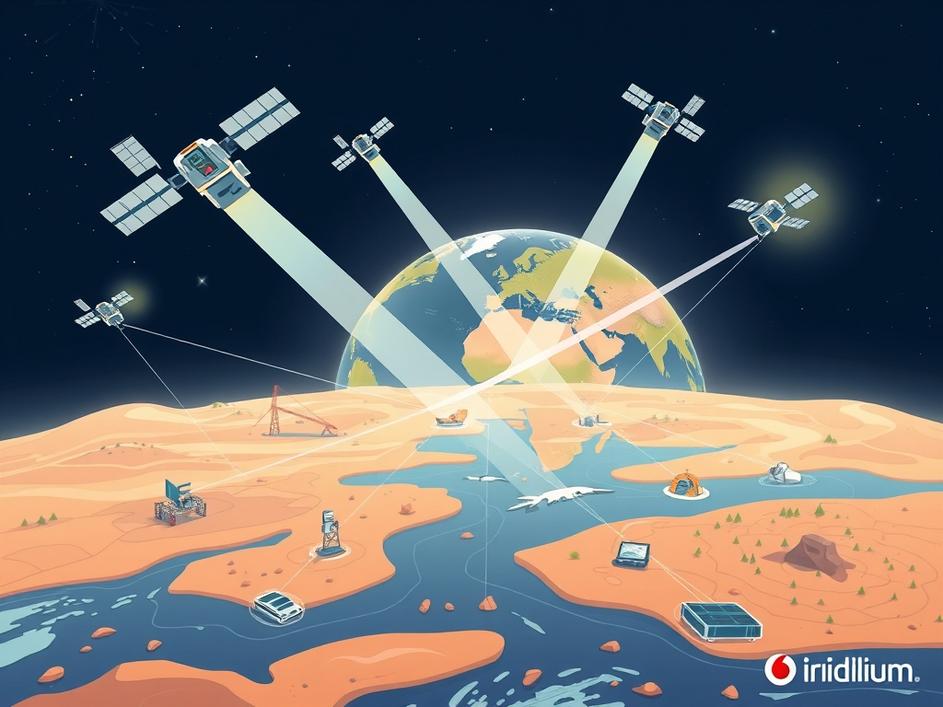


We are a digital agency helping businesses develop immersive, engaging, and user-focused web, app, and software solutions.
2310 Mira Vista Ave
Montrose, CA 91020
2500+ reviews based on client feedback

What's Included?
ToggleWe’ve all been there: reaching for our phone in a remote spot, only to find ‘No Service’. It’s frustrating when you just want to make a call or send a message. But what about the millions of ‘things’ – the sensors, trackers, and devices that are increasingly becoming part of our daily lives and businesses? These Internet of Things (IoT) devices also need to talk, and they often face even bigger challenges with connectivity. This is why the recent news about Vodafone IoT teaming up with Iridium is such a big deal. They are joining forces to provide Non-Terrestrial Network (NTN) Narrowband IoT (NB-IoT) connectivity. In simple terms, they’re bringing internet to places it’s never been before for the things we use every day. This partnership means Vodafone IoT’s customers will get even more coverage across the planet, helping businesses keep tabs on their assets no matter how remote.
To really appreciate this news, let’s quickly think about what IoT is and why coverage matters so much. Imagine IoT as a massive, invisible web where everything from a tiny temperature sensor in a refrigerated truck to a giant cargo container on a ship has its own voice. These devices collect bits of data and send them back to a central system. This information helps businesses operate more efficiently, track assets, and make smarter decisions. But for IoT to truly deliver on its promise, these “voices” need to be heard consistently. Most IoT devices currently rely on regular cellular networks, which are great in cities and populated areas. However, think about a farm in the middle of nowhere, a pipeline stretching through a vast desert, or a fishing vessel in the middle of an ocean. These places often have no cell service at all. That’s a big problem for companies that need constant updates from their remote equipment, leading to gaps in data, lost tracking, and less efficient operations. Until now, bridging these coverage gaps was either very expensive or just not possible.
This is precisely where Iridium steps in with its unique satellite setup. Unlike traditional geostationary satellites that stay in one fixed spot high above Earth, Iridium uses a network of low-Earth orbit (LEO) satellites. These satellites constantly move around the planet, creating a sort of invisible, interconnected “mesh” of coverage. Think of it like a giant, seamless blanket covering the entire globe, from pole to pole. This means wherever your IoT device might be, there’s always an Iridium satellite passing overhead, ready to relay a signal. This design is especially well-suited for NB-IoT because it can handle small bursts of data from many devices, even those with low power. It’s a very robust and reliable way to connect things that are far away from any ground-based cell tower, offering true global reach and resilience that traditional networks can’t match.
So, what does this exciting partnership mean for Vodafone’s IoT customers? It means they can now reliably connect their IoT devices in locations that were previously impossible to reach. Picture a logistics company tracking shipping containers as they cross the vast Pacific Ocean, receiving real-time updates on their location, temperature, and condition. Or an agricultural business monitoring soil moisture levels on fields that span hundreds of acres, without worrying about patchy cell service. This new capability could also benefit utility companies keeping tabs on remote power grids, or environmental agencies tracking wildlife and monitoring conditions in untouched national parks. This isn’t just about extending network coverage; it’s about enabling entirely new business models and bringing unprecedented levels of efficiency and safety to existing operations. It truly opens up a whole world of possibilities for data collection, asset management, and operational insights that simply weren’t practical or even conceivable before.
From my perspective, this collaboration is a very smart and strategic move for Vodafone. In the competitive and rapidly growing world of IoT, offering truly global, consistent connectivity is a massive differentiator. Many businesses are looking to expand their operations globally, whether it’s managing assets across continents or monitoring conditions in hard-to-reach areas. They absolutely need reliable data to do that effectively. By teaming up with Iridium, Vodafone isn’t just adding another service; they are directly solving a core, pressing problem that many enterprises face. This move significantly strengthens Vodafone’s position in the market for connecting devices, especially for key sectors like logistics, agriculture, mining, and maritime industries. It’s not just about the underlying technology; it’s about providing peace of mind and allowing businesses to operate more efficiently and safely, knowing their valuable assets are always connected and reporting back, regardless of location. This partnership highlights a forward-thinking approach to addressing the evolving and increasingly complex needs of our connected world.
This collaboration between Vodafone IoT and Iridium points to a bigger, powerful trend: the accelerating move towards ubiquitous connectivity. We are steadily building a world where almost anything can communicate, no matter its physical location on the planet. This kind of satellite-enabled NB-IoT is crucial for a future where smart cities seamlessly extend to smart regions, where global supply chains offer complete transparency from the point of origin to the final destination, and where crucial environmental monitoring can happen even in the most remote corners of the Earth. It’s not just about getting a signal; it’s about making entire systems more resilient, gathering more comprehensive and reliable data, and ultimately empowering us to make better, more informed decisions. This partnership isn’t just a small, incremental step; it’s a confident and significant stride towards a future where “dead zones” are truly a thing of the past for IoT devices, effectively making the entire planet a truly connected place.
To sum it all up, the news about Vodafone IoT and Iridium joining forces is a really significant development for the entire connected world. It directly tackles one of the most fundamental challenges in the realm of connected devices: achieving reliable global coverage. By expertly blending Vodafone’s strong and expansive IoT offerings with Iridium’s unmatched, truly global satellite network, businesses can now confidently look forward to a future where their remote assets are always within reach, always reporting. This means they will benefit from more data, gain deeper insights, and be able to run operations that are inherently smarter, safer, and more efficient, no matter their geographic location. It’s a very clear sign that the ambitious vision of a truly interconnected world is quickly becoming a tangible reality, one satellite link at a time.



Comments are closed